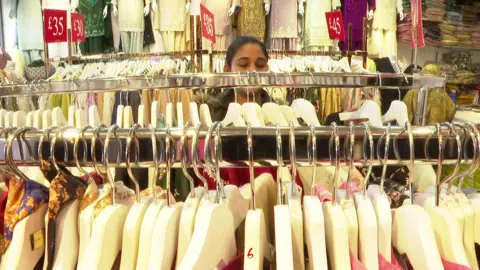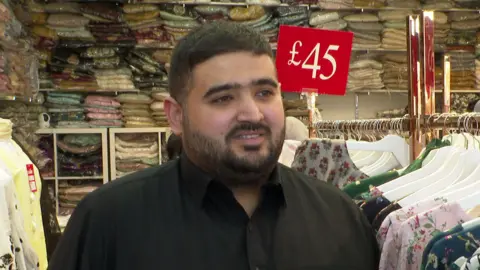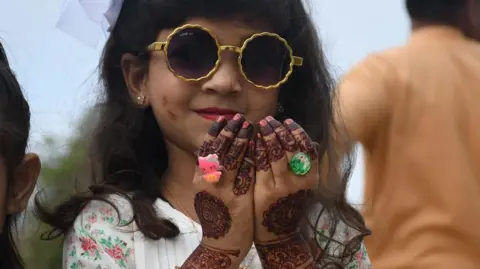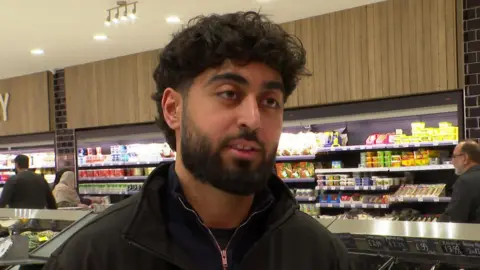'In Bradford, families spend thousands on new clothes for Eid'
 Arzu Dutta/BBC
Arzu Dutta/BBCFrom new outfits to luxurious banquets, Eid can be an expensive time of year for Britain's Muslim population.
Eid al-Fitr is the celebration at the end of Ramadan, a month of fasting, and is a time for friends and family to come together for feasting and sharing gifts.
Of course big celebrations don't come cheap and for many businesses across Bradford, Eid is boom time.
Nasreen Karim, Bradford Chamber of Commerce's BAME Business Committee chair, estimates an average family of five or six could spend upwards of £3,000 over an Eid weekend.
She says a family would "easily" spend £1,200 on new clothes, up to £500 on a food shop and then there's gifts, eating out, and maybe even renting a supercar.
"You can see how it's clocking up and people don't even know how much they're spending, but they know Eid is expensive," she says.
"People have been fasting for a whole month, so they want to feast, they want to go out, they want to celebrate. They want to meet up with friends, they want to go out for meals and desserts.
"Generally," she adds, "people spend that locally.
"Sometimes women will go shopping to other cities, for example if you go to Bradford Plaza there will be lots of people there from other cities. So some people may shop in Leicester or Birmingham, but mostly it's spent in Bradford."
 Arzu Dutta/BBC
Arzu Dutta/BBCAccording to think tank Equi, British Muslims generate £70bn for the UK's economy, with Muslim-owned businesses contributing at least £24.7bn a year.
This year the religious festival is expected to be observed on 30 March but the date remains subject to the official sighting of the moon by an imam or Islamic authority.
At Leeds Road shopping centre Bradford Plaza, the week before the celebrations has been busier than ever.
Atsham Ali, who works at clothes store Shaam G, says the week before the celebrations has led to an increase in sales of about 60%.
He says: "This is one of the busiest periods in our business, especially these last few days before Eid because we'll be open till about 2am on the last two days.
"This year the farshi shalwar is a new trend, which used to be in fashion in the 1970s, but it's come back and that's been the most in-demand item for us this time.
"We're getting customers from all over the UK, Birmingham, Glasgow and customers come to Bradford for Eid especially."
For Rubina Shah, owner of Ruby's Hair and Beauty, Eid couldn't come soon enough as the start of the year has been quiet, with customers reluctant to brave the winter weather.
"During Eid, business increases about 60%, but this year it's 80% because at the beginning of the year it wasn't very busy, so we're looking to this Eid to increase business," she says.
Henna is one of the most popular services people book for the festival, she says, with it being traditional for women to decorate their hands and arms.
 Getty Images
Getty ImagesHenna artist Samia Kahn says the week before Eid is her busiest time of year, with women and girls choosing floral patterns and swirls.
"Typically Eid is when especially children get henna, and they look forward to it," she says.
"It's traditional and it's something exciting to look forward to. It's something different and it fades over a few days so they get to keep it for a week or so, two weeks."
She only charges £5 a hand, but says there are more reasons to practice the art than the financial benefits.
"It's not something that's big money but it's nice especially for children. They're excited about it.
"For little jobs like Eid, where there isn't big money involved [as opposed to a wedding], it's not necessarily about the money, it's about providing a service and putting smiles on faces."
 Arzu Dutta/BBC
Arzu Dutta/BBCOf course no celebration is complete without a feast, and at Al Halal supermarket, store manager Zain Alam says the food is what he's most looking forward to - especially after 30 days of fasting.
"It's a time for families to get together, it's a time for to enjoy after fasting for the full month of Ramadan, it's a big event.
"One way of spending a lot of time with families, especially in our community, is by eating a lot," he says.
The supermarket has also seen customers spend about twice as much in the run-up to Eid as they usually would.
Mr Alam says: "It's been amazing to see customers return. It's been quite busy in terms of everyone doing their last-minute shopping.
"Customers probably spend about twice the amount on their shopping. They're doing full trolley shops at the moment.
"The will spend money on bulk items – oil, drinks, and meat shopping. A lot of customers buy a full lamb or a full sheep rather than just a kilo or two of meat.
"We're running out of everything, we're constantly having to restock."
Listen to highlights from West Yorkshire on BBC Sounds, catch up with the latest episode of Look North.
